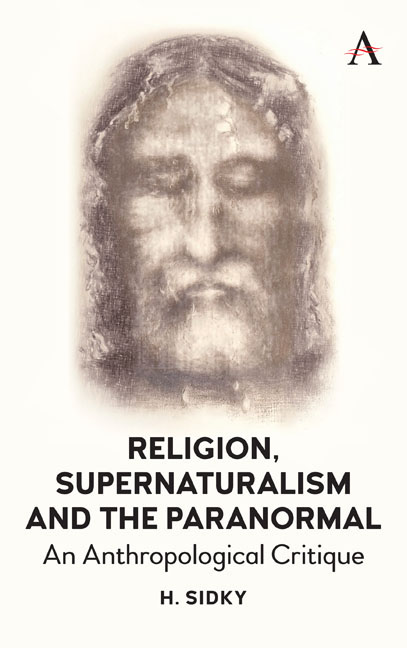Book contents
- Frontmatter
- Dedication
- Contents
- Acknowledgments
- Introduction
- Chapter One The Problem with Religion: Preliminary Issues
- Chapter Two The Unreal Real: The Supernatural, Religion, and the Paranormal
- Chapter Three Can Science Say Anything About Religion and the Supernatural?
- Chapter Four Ghostly Rappings, the Science of the Soul, and the Religious Nature of the Paranormal
- Chapter Five Ghostly Encounters in the Field: Anthropology of the Paranormal or Paranormal Anthropology?
- Chapter Six Why We Think the World Is Haunted
- Chapter Seven Cognitive Biases and Why People Think Eerie Thoughts
- Chapter Eight Miracles as Evidence of God's Actions in the World
- Chapter Nine When God Talks to People: Are Religious Experience Evidence of God?
- Chapter Ten Books Authored by God? Sacred Texts as Evidence of the Supernatural
- Chapter Eleven God's Fingerprints in the Natural World: Intelligent Design, Irreducible Complexity, and Cosmic Fine-Tuning
- Chapter Twelve The Miracles of the Bible: The Quintessential Foundations of Paranormal Beliefs in Western Culture
- Chapter Thirteen Jesus the Miracle Worker, Magician, and Sorcerer
- Chapter Fourteen Jesus's Empty Tomb, Missing Body, and Return from The Dead: Sources for the Paranormal Tale
- Chapter Fifteen The Post-Resurrection Appearances in the New Testament
- Chapter Sixteen Coping with Failed Prophesy: A Socio-Psychological Explanation for the Rise of Christianity
- Chapter Seventeen Conclusions: Why Religious and Paranormal Beliefs Persist and Their Dangers
- References
- Index
Chapter Three - Can Science Say Anything About Religion and the Supernatural?
Published online by Cambridge University Press: 16 December 2019
- Frontmatter
- Dedication
- Contents
- Acknowledgments
- Introduction
- Chapter One The Problem with Religion: Preliminary Issues
- Chapter Two The Unreal Real: The Supernatural, Religion, and the Paranormal
- Chapter Three Can Science Say Anything About Religion and the Supernatural?
- Chapter Four Ghostly Rappings, the Science of the Soul, and the Religious Nature of the Paranormal
- Chapter Five Ghostly Encounters in the Field: Anthropology of the Paranormal or Paranormal Anthropology?
- Chapter Six Why We Think the World Is Haunted
- Chapter Seven Cognitive Biases and Why People Think Eerie Thoughts
- Chapter Eight Miracles as Evidence of God's Actions in the World
- Chapter Nine When God Talks to People: Are Religious Experience Evidence of God?
- Chapter Ten Books Authored by God? Sacred Texts as Evidence of the Supernatural
- Chapter Eleven God's Fingerprints in the Natural World: Intelligent Design, Irreducible Complexity, and Cosmic Fine-Tuning
- Chapter Twelve The Miracles of the Bible: The Quintessential Foundations of Paranormal Beliefs in Western Culture
- Chapter Thirteen Jesus the Miracle Worker, Magician, and Sorcerer
- Chapter Fourteen Jesus's Empty Tomb, Missing Body, and Return from The Dead: Sources for the Paranormal Tale
- Chapter Fifteen The Post-Resurrection Appearances in the New Testament
- Chapter Sixteen Coping with Failed Prophesy: A Socio-Psychological Explanation for the Rise of Christianity
- Chapter Seventeen Conclusions: Why Religious and Paranormal Beliefs Persist and Their Dangers
- References
- Index
Summary
The God hypothesis is a myth [and] a myth is not a good explanation, and widespread encouragement of this particular myth undercuts a correct understanding of the Universe's and [humankind's] origin, nature, and destiny.
— Michael Scriven, Primary Philosophy (1966)The best explanation for why there has been so far no convincing, independently verifiable evidence for supernatural phenomena, despite honest and methodologically sound attempts to verify them, is that these phenomena probably do not exist. Indeed, the absence of evidence, where such evidence is expected to be found after extensive searching, is evidence of absence.
To declare the study of supernatural phenomena out of bounds to scientific investigation imposes artificial constraints on scientific inquiry [and] denies science the noble task of purging false beliefs from the public sphere [and] the opportunity to discover aspects of reality that may have significant worldview implications.
— Yonata Fishman, Can Science Test Supernatural Worldviews? (2009)It is not controversial that science does not recognise ancestor spirits, astral intelligences, demons […] ghosts, gods […] and the like. There is no reason to doubt that the listed entities and powers will not be recognised by any future science […] we have enough securely established science to rule out that future science will […] recognize the listed entities and powers.
— Graham Oppy, Naturalism and Religion (2018)Reality stubbornly refuses to be bent to our desires or ideologies. Reality does not yield to wishful thinking.
— Douglas Futuyma, Science on Trial (1982)The “thou shalt not speak ill of religion” stance, discussed in Chapter 1, is associated with another problematic conviction on the part of many scholars, namely that religious and supernatural phenomena are not amenable to scientific analysis. The widely held opinion is that science and religion have different aims and realms of inquiry. Science is relegated exclusively to the investigation of physical phenomena and the search for naturalistic mechanisms based on an a priori commitment to methodological naturalism. Religion, in contrast, is consigned to addressing questions relating to ultimate meaning and ethical values that presumably only religion can address.
Science and Religion: Non-Overlapping Magisteria?
The idea that religion and science have separate domains is not new. However, the most explicit contemporary formulation of this idea appears in the work of the late evolutionary paleontologist Stephen Jay Gould.
- Type
- Chapter
- Information
- Religion, Supernaturalism, the Paranormal and PseudoscienceAn Anthropological Critique, pp. 57 - 92Publisher: Anthem PressPrint publication year: 2019



